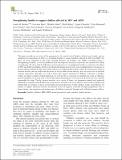| dc.contributor.author | Richter, Linda M. | |
| dc.contributor.author | Sherr, Lorraine | |
| dc.contributor.author | Adato, Michèle | |
| dc.contributor.author | Belsey, Mark | |
| dc.contributor.author | Chandan, Upjeet | |
| dc.contributor.author | Desmond, Christopher J. | |
| dc.contributor.author | Drimie, Scott | |
| dc.contributor.author | Haour-Knipe, Mary | |
| dc.contributor.author | Hosegood, Victoria | |
| dc.contributor.author | Kimou, Jose | |
| dc.contributor.author | Madhavan, Sangeetha | |
| dc.contributor.author | Mathambo, Vuyiswa | |
| dc.contributor.author | Wakhweya, Angela | |
| dc.date.accessioned | 2010-11-10T16:01:23Z | |
| dc.date.issued | 2009 | |
| dc.identifier.citation | Richter, Linda M., Lorraine Sherr, Michèle Adato, Mark Belsey, Upjeet Chandan, Chris Desmond, Scott Drimie, Mary Haour-Knipe, Victoria Hosegood, Jose Kimou, Sangeetha Madhavan, Vuyiswa Mathambo, and Angela Wakhweya. 2009. Strengthening families to support children affected by HIV and AIDS. AIDS Care 21(S1): 3-12. | en_US |
| dc.identifier.issn | 0954-0121 | en_US |
| dc.identifier.uri | http://nrs.harvard.edu/urn-3:HUL.InstRepos:4553217 | |
| dc.description.abstract | This paper provides an overview of the arguments for the central role of families, defined very broadly, and we emphasise the importance of efforts to strengthen families to support children affected by HIV and AIDS. We draw on work conducted in the Joint Learning Initiative on Children and AIDS's Learning Group 1: Strengthening Families, as well as published data and empirical literature to provide the rationale for family strengthening. We close with the following recommendations for strengthening families to ameliorate the effects of HIV and AIDS on children. Firstly, a developmental approach to poverty is an essential feature of responses to protect children affected by HIV and AIDS, necessary to safeguard their human capital. For this reason, access to essential services, such as health and education, as well as basic income security, must be at the heart of national strategic approaches. Secondly, we need to ensure that support garnered for children is directed to families. Unless we adopt a family oriented approach, we will not be in a position to interrupt the cycle of infection, provide treatment to all who need it and enable affected individuals to be cared for by those who love and feel responsible for them. Thirdly, income transfers, in a variety of forms, are desperately needed and positively indicated by available research. Basic economic security will relieve the worst distress experienced by families and enable them to continue to invest in the health care and education of their children. Lastly, interventions are needed to support distressed families and prevent knock-on negative outcomes through programmes such as home visiting, and protection and enhancement of children's potential through early child development efforts. | en_US |
| dc.language.iso | en_US | en_US |
| dc.publisher | Taylor & Francis | en_US |
| dc.relation.isversionof | doi:10.1080/09540120902923121 | en_US |
| dc.relation.hasversion | http://www.ncbi.nlm.nih.gov/pmc/articles/PMC2903779/pdf/ | en_US |
| dash.license | LAA | |
| dc.subject | families | en_US |
| dc.subject | children | en_US |
| dc.subject | HIV/AIDS | en_US |
| dc.subject | social protection | en_US |
| dc.subject | cash transfers | en_US |
| dc.subject | family services | en_US |
| dc.title | Strengthening Families to Support Children Affected by HIV and AIDS | en_US |
| dc.type | Journal Article | en_US |
| dc.description.version | Version of Record | en_US |
| dc.relation.journal | AIDS Care | en_US |
| dash.depositing.author | Desmond, Christopher J. | |
| dc.date.available | 2010-11-10T16:01:23Z | |
| dash.affiliation.other | SPH^Francois Xavier Bagnoud | en_US |
| dc.identifier.doi | 10.1080/09540120902923121 | * |
| dash.contributor.affiliated | Desmond, Christopher J. | |


